How doctor's betrayal led to Terry Waite being taken hostage for four years
It appeared to be the news the world was waiting to hear.
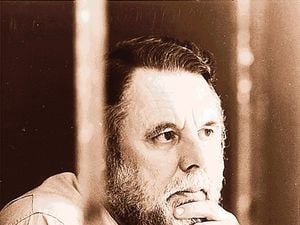
Terry Waite, the Archbishop of Canterbury's envoy who negotiating the release of hostages held by Islamist extremists, had cancelled his flight home.
It was reported Waite had made progress in securing the freedom of British journalist John McCarthy, Northern Irish author Brian Keenan, and five Americans being held hostage in Beirut. Hopes were high the men could soon be heading home.
That was 35 years ago today. But a few hours later the real real reason why Waite would not be flying home emerged: he had himself been taken hostage. He would spend the next four years of his life in solitary confinement and subjected to brutal torture, both mentally and physically.
The West reacted with horror. While most of the Beirut hostages were soft targets – journalists and academics chosen simply because of the countries they came from – the capture of Waite seemed the most cowardly of all. Waite hoped he would succeed where politicians and diplomats had failed simply because he was a man of the church with no political agenda. But his faith in human nature would be wickedly betrayed.
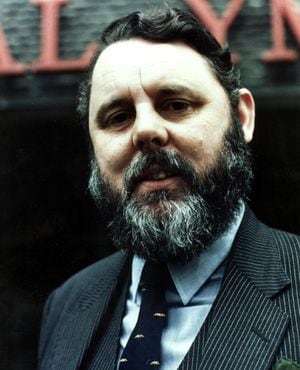
Born just outside Wilmslow in Cheshire, Waite took up a post with new Archbishop of Canterbury Rt Rev Dr Robert Runcie in 1980. One of his early triumphs was securing the release of a group of Anglican clergy held hostage in Iran, inlcuding the Rev Iraj Mottahedeh who now lives in Shropshire.
In November 1984, a meeting with Libyan leader Col Muammar Gaddafi, resulted in the release of British hostages Michael Berdinner, Alan Russell, Malcolm Anderson and Robin Plummer.
But his interventions in the Lebanese Hostage Crisis, which saw 104 foreign nationals kidnapped over a 10-year period, were far more complex.
In 1985 Waite successfully negotiated the release of American hostages Father Lawrence Jenco, a Catholic priest, and David Jacobsen.
But it later emerged that US Lt Col Oliver North had also been working behind the scenes, brokering an illegal arms deal with the Iranian government in exchange for the release of hostages. The money raised was then diverted to the anti-communist Contra rebels in Nicaragua. While Waite insisted he had no involvement whatsoever in the deal, the warlords of Lebanon were furious. Their suspicions were compounded when it emerged Waite had used a US helicopter for a secret trip to Lebanon, and had also been seen with North.
Reportedly unhappy about the controversy, Runcie is said to have summoned Waite to a meeting in November 1986 to dismiss him. But he agreed his envoy could go on one last trip before they parted company.
Waite arrived in Beirut on January 12, 1987, and a few days later he was contacted by a local doctor who had facilitated meetings in the past. He met him unaccompanied that evening at his consulting room.
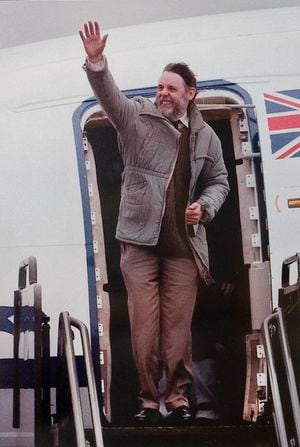
Previous requests to see the hostages had been rebuffed, but this time the doctor said he would be allowed.The hostages were sick, the man told him, and depressed by the stories about North and the Irangate scandal.
Waite voiced concerns about his safety, and asked for the doctor's hand as an assurance he would not be taken hostage.
"He stretched out his hand and said, 'We will not keep you'," said Waite.
He still had doubts, and sought advice, but ultimately the decision was down to him:
"I felt that if I had been given safe conduct, if the man was telling me the truth and if I didn't go and one of the hostages died, then I'd have to live with my conscience for the rest of my life."
On the evening of January 20, 1986, Waite went to the doctor's consulting room and immediately suspected something was wrong.
"As I got there the telephone rang," he said. "The doctor answered it and said, 'I'm sorry I've got to leave you, there's an emergency at the hospital'.
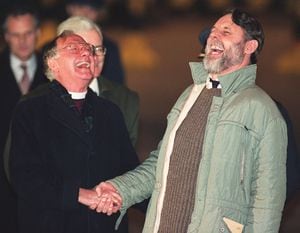
"I remember pacing up and down in his consulting room thinking what I should do at this point. But I thought as I had come so far I should go through with it."
After being driven across the city and blindfolded, he was taken to a safe house and given a change of clothing.
One night, after three or four days, he was told he was being taken to see the hostages and put into a van, where he was taken to what he thought was an underground garage at a block of flats.
"I was told to get out of the van and there in the floor was a trapdoor. He said, 'jump down'," Waite recalled.
"I was pushed across the room and the door closed behind me. When I took my blindfold off I was in a tiled cell. Then I realised that was it: I was a hostage, no longer a negotiator."
The 6ft 7in envoy could barely stand up, let alone walk around the room. The only window was obscured by a shutter.
He was chained hand and foot facing a wall for 23 hours and 50 minutes a day, allowed just a 10-minute break to use the bathroom. Convinced he was a CIA agent, his captors subjected Waite to torture sessions in which the soles of his feet were whipped with a cable.
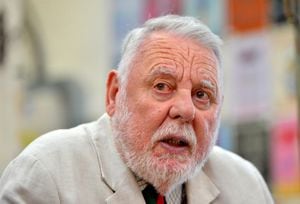
On more than one occasion a gun was put to his head and he was told he was about to be executed.
"I went four-and-half years without speaking to anyone else," he said.
"There was no companionship, no natural light and I slept on the floor with nothing.
"I refused food for the first week because I was so angry. I was angry at being treated in this way but also my refusal showed I still had a measure of control over my situation."
Waite also found the lack of books and newspapers difficult.
"I used to try and ask for books and they wouldn’t bring me any," he said.
"Not for about three-and-half years until one day a kindly guard said 'I’ll try and get you a book'."
Finding humour in even the darkest of situations, Waite was amused by the first book his guard managed to find.
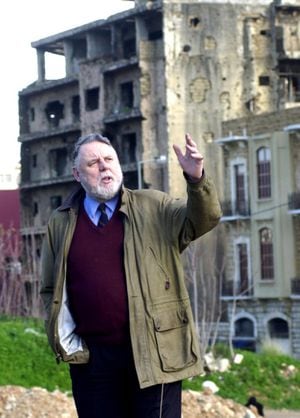
"He didn’t know what to get because he didn’t read English," he said.
"There aren’t many funny things about life in captivity but I laughed out loud when I saw this book.
"Unknown to him, he had bought me The Great Escape.” Still, it was a better choice than his next efforts: a guide to breastfeeding and a book on childcare.
Waite spent 1,763 days in captivity before he was finally released on November 18, 1991.
He said he found the first 12 months of freedom traumatic, but said he coped by not dwelling on it unduly, and remembering that others had suffered more.
He even returned to Lebanon, to meet up with his captors.
“They were surprised to see me,” he said.
Now 82, he served for 15 years as president of the Llangollen Eistedfodd, before retiring last year.





